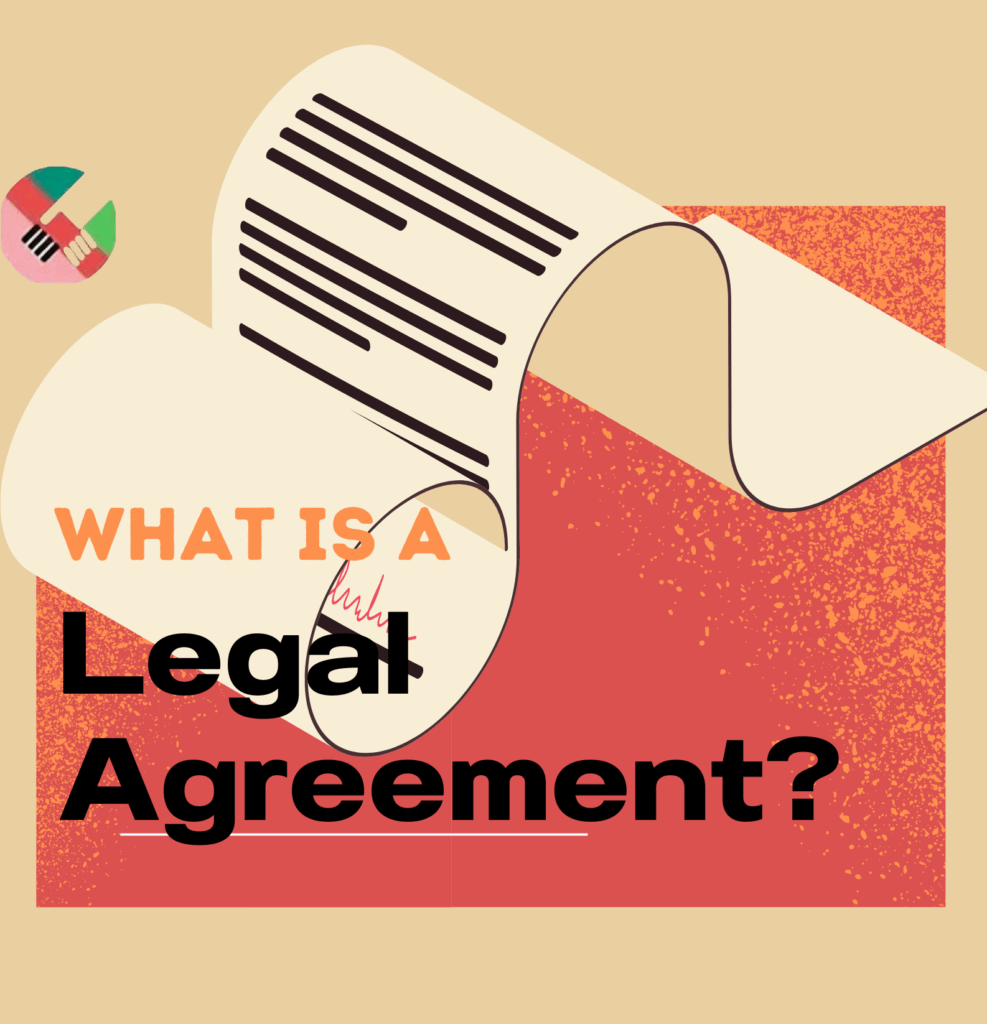Understanding legal agreements is crucial for anyone conducting business or making important decisions involving other parties. Whether you’re signing an employment contract, entering a service agreement, or creating a business partnership, knowing what makes an agreement legally binding can protect your interests and prevent costly disputes.
Table of Contents
What is a Legal Agreement?
A legal agreement is a mutual understanding between two or more parties that outlines their respective rights, responsibilities, and obligations. According to the Legal Information Institute, “agreement” generally has a wider meaning than “contract,” “bargain,” or “promise.”
Legal agreements serve as the foundation for countless interactions in both personal and business contexts, ranging from simple verbal understandings to complex written documents governing multi-million dollar transactions.
Key Characteristics of a Legal Agreement
- Mutual Understanding: All parties must clearly comprehend what they’re agreeing to and what’s expected of them.
- Rights and Obligations: Legal agreements define what each party is entitled to receive and what they must provide.
- Variable Enforceability: Crucially, not all agreements are legally enforceable—enforceability depends on whether the agreement meets specific legal requirements.
Legal Agreement vs Contract: Key Differences
One of the most common sources of confusion involves the distinction between agreements and contracts. While every contract is indeed an agreement, not every agreement qualifies as a legally binding contract.
Agreements are broader arrangements that may rely on trust and goodwill rather than legal enforcement. They can be informal understandings, preliminary discussions, or non-binding arrangements.
Contracts are specific types of agreements that the law will enforce. A contract creates legal obligations between the parties involved, meaning if someone doesn’t hold up their end of the bargain, the other party can seek legal remedies.
| Aspect | Agreement | Contract |
| Formality | Can be informal | Generally formal |
| Legal Enforceability | May or may not be enforceable | Always legally enforceable |
| Consequences of Breach | Limited legal recourse | Legal remedies available |
Essential Elements of a Legal Agreement
For an agreement to be legally enforceable, it must contain: mutual assent, expressed by a valid offer and acceptance; adequate consideration; capacity; and legality.
Offer and Acceptance
- Offer: A clear, definite proposal made by one party to another with the intention of entering into a legally binding agreement. The offer must be specific, communicated effectively, and demonstrate genuine intent.
- Acceptance: The other party’s unequivocal agreement to all terms of the offer. Acceptance must mirror the offer exactly, reflecting an unambiguous intent to be bound by its terms.
Consideration
Consideration refers to something of value that is exchanged between the parties involved. It validates the agreement and can be in the form of money, goods, services, or a promise to perform or refrain from performing a certain action.
Legal Capacity
All parties must have the legal capacity to enter into agreements, meaning they must:
- Be of legal age (typically 18 years or older)
- Have mental competency to understand the agreement
- Not be under duress or undue influence
Legal Purpose
The contract must have a lawful purpose, it cannot violate the law or applicable regulations. Agreements involving illegal activities are void and unenforceable.
Mutual Intent
Mutual intent, also known as a “meeting of the minds,” means that both parties must have a clear understanding and agreement on the terms of the contract.
Types of Legal Agreements
Legal agreements come in various forms, each serving different purposes:
Based on Documentation
- Written Agreements: Provide clear evidence of terms and are easier to enforce. While some contracts can be oral, many situations necessitate written documentation to be recognized legally, such as real estate transactions.
- Oral Agreements: While many agreements are formalised in writing to ensure clarity and enforceability, oral agreements are also legally binding, provided they meet the essential elements of a contract.
Based on Enforceability
- Binding Agreements: A “binding contract” is any agreement that’s legally enforceable. That means if you sign a binding contract and don’t fulfill your end of the bargain, the other party can take you to court.
- Non-Binding Agreements: Serve as frameworks for discussions without creating legal obligations if parties fail to follow through.
Legal Agreement Format and Requirements
The format varies depending on complexity, but well-structured agreements typically include:
- Title and Date: Clear identification and execution date.

- Party Identification Complete names and legal status
- Terms and Conditions: Detailed obligations and rights
- Consideration: Clear statement of value exchange
- Duration and Termination: Time periods and ending conditions
- Signatures: Proper execution by all parties
For businesses requiring regular legal documentation and agreement management, platforms like [VakilTech](https://vakiltech.in/) provide comprehensive legal technology solutions to streamline contract creation and management processes.
When is an Agreement Legally Binding?
Courts don’t just look at whether documents are labeled “contract”; they examine the substance of the agreement and the behaviors of all parties involved.
Key indicators include:
- Clear, definite terms that can be understood and enforced
- Consideration exchange between all parties
- Lawful purpose that doesn’t violate public policy
- Intent to create legal relations
Common Legal Agreement Examples
Business Agreements
- Service Agreements: Contracts for service provision
- Employment Agreements: Employer-employee relationship contracts
- Partnership Agreements: Business partnership documents
- Non-Disclosure Agreements: Confidentiality protection contracts
Consumer Agreements
- Purchase Agreements: Buying goods or services
- Lease Agreements: Property or equipment rental
- Insurance Agreements: Coverage policies
- Loan Agreements: Borrowing contracts
Creating Valid Legal Agreements
Best Practices
- Use Clear Language: Use clear, concise language that can be easily understood by all parties.
- Avoid Ambiguity: Ensure terms are specific and cannot be interpreted multiple ways.
- Include All Material Terms: Don’t leave important details to be determined later.
- Seek Legal Review: Have a legal expert review the entire contract to ensure consistency and meet all legislative requirements.
For businesses dealing with complex legal agreements or requiring ongoing legal support, consulting with legal technology specialists at VakilTech can help ensure compliance and proper documentation.
Enforcing Legal Agreements
Legal Remedies for Breach
If a promise is breached, the law provides remedies to the harmed party, often in the form of monetary damages, or in limited circumstances, in the form of specific performance of the promise made.
Monetary Damages:
– Compensatory damages for actual losses
– Consequential damages for indirect losses
– Liquidated damages (pre-agreed amounts)
Equitable Remedies:
– Specific performance (court order to fulfill agreement)
– Injunction (court order to stop/require actions)
– Rescission (agreement cancellation)
To Conclude
A legal agreement turns intentions into defined rights and duties, and it becomes a contract only when the law recognises offer and acceptance, consideration, capacity, lawful purpose, and intent to create legal relations. Whether oral, written, or electronic, clarity of terms and practical details like stamping, registration, and signatures shape enforceability. Well-structured clauses on scope, IP, confidentiality, indemnity, liability, and exits reduce friction, while a clear documentary trail and proportionate remedies provide a steady path forward if disagreements arise; when they do, you can begin with a formal notice through. You can send a legal notice with VakilTech with an easy and seamless online procedure.
Frequently Asked Questions About Legal Agreements in India
Yes, verbal agreements can be legally binding if they contain all essential contract elements. However, verbal contracts can be difficult to prove as legally binding, and certain agreements (like real estate transactions) must be written.
The non-breaching party may seek monetary damages, specific performance, or agreement cancellation, depending on the circumstances and agreement terms.
There is no automatic right to cancel a legally binding contract once there has been a valid offer and acceptance. Limited exceptions exist for consumer contracts with cooling-off periods or agreements obtained through fraud.
A service agreement becomes binding when it includes clear service descriptions, payment terms, delivery timelines, and agreement from both parties with legal capacity for a lawful purpose.

Passionate about using the law to make a difference in people’s lives. An Advocate by profession.





